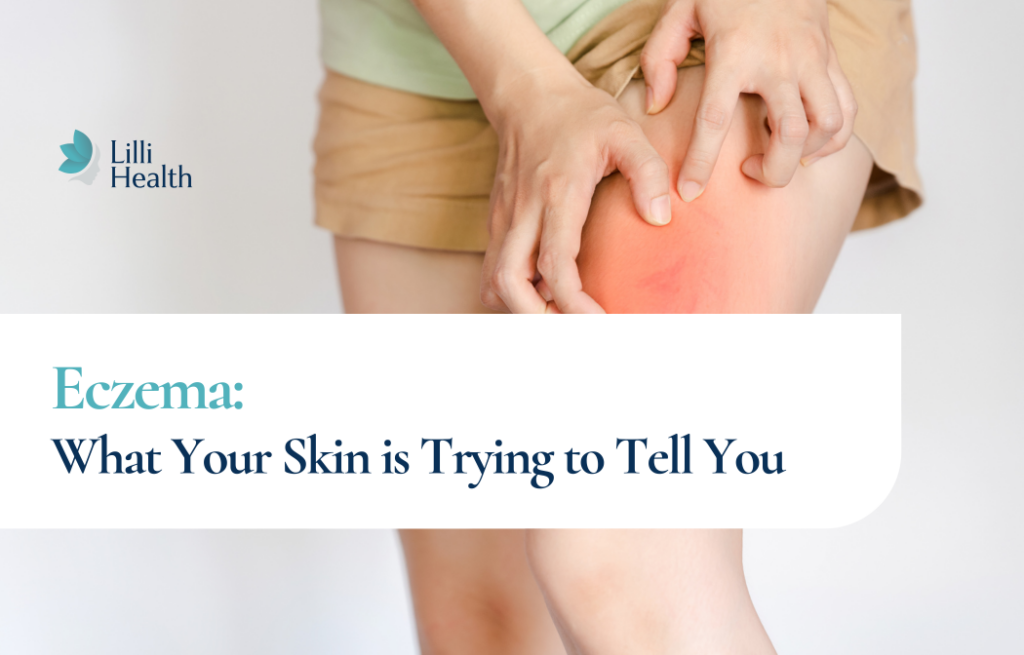

Eczema and Insulin Resistance: What Your Skin Might Be Trying to Tell You
If you’ve ever struggled with eczema, you know it’s more than just dry skin. The constant itch, the inflammation, the flare-ups that seem to come out of nowhere—it can feel like a never-ending battle.
But what if your skin is trying to tell you something deeper?
What if eczema isn’t just a skin problem…
What if it’s a metabolic signal?
Let’s talk about how insulin resistance may be playing a bigger role than anyone ever told you.
What Is Eczema?
Eczema, also known as atopic dermatitis, is a chronic skin condition that causes dry, itchy, inflamed skin. It can show up in different places on the body and range from mild to severe.
It’s often linked to allergies, asthma, or a family history of sensitive skin—but those aren’t the whole story. Many people don’t realize that eczema is also inflammatory, and chronic inflammation is a key player in insulin resistance.
The Inflammation Connection
Insulin resistance is a condition where your body stops responding well to insulin, so the pancreas makes more of it. Over time, these chronically high insulin levels trigger systemic inflammation throughout the body.
And guess where one of the first places that inflammation often shows up?
Your skin.
Your skin is your body’s largest organ, and it’s incredibly responsive to internal changes. When inflammation levels are high, your skin barrier becomes weaker. That means:
- Moisture escapes more easily
- Irritants get in more easily
- Your immune system goes on high alert
That’s eczema in a nutshell.
Why It’s Not Just About Triggers
Yes, eczema can flare up with certain soaps, detergents, foods, or weather changes.
But the deeper question is: Why is your skin so reactive in the first place?
When insulin resistance is present, your immune system is already heightened. Your skin is already on edge. So the tiniest trigger causes a massive overreaction.
You can keep chasing triggers and eliminating more and more things from your life…
Or you can go deeper and ask, “Why is my skin so inflamed to begin with?”
So What Can You Do?
Here’s the good news: Lowering insulin levels has been shown to lower inflammation across the board—including in the skin.
That means eczema flare-ups may become less frequent, less intense, and easier to manage. Some people even find that their eczema goes away completely when they begin eating in a way that keeps insulin low.
We’re not saying a cream won’t help. But if you’re only treating eczema on the surface and never addressing what’s happening inside, you may always be stuck in a cycle of flare-ups and frustration.
The Bottom Line
Eczema isn’t just dry skin. It’s inflammation. And insulin resistance may be one of the biggest drivers of that inflammation.
If you’ve never tested your insulin levels, this is your sign to start. And if you’ve never considered that your skin symptoms could be part of a bigger metabolic picture, this is your invitation to dig deeper.
A Low Insulin Lifestyle doesn’t just help with weight or energy or hormones—it can help with your skin too. Because when your metabolism is happy, your skin tends to be a whole lot happier too.
References
González-Saldivar G, et al. Skin Manifestations of Insulin Resistance: From a Biochemical Stance to a Clinical Diagnosis and Management. Dermatol Ther (Heidelb). 2017. Read more
Hu Y, Zhu Y, Lian N, Chen M, Bartke A, Yuan R. Metabolic Syndrome and Skin Diseases. Front Endocrinol (Lausanne). 2019. Read more






















